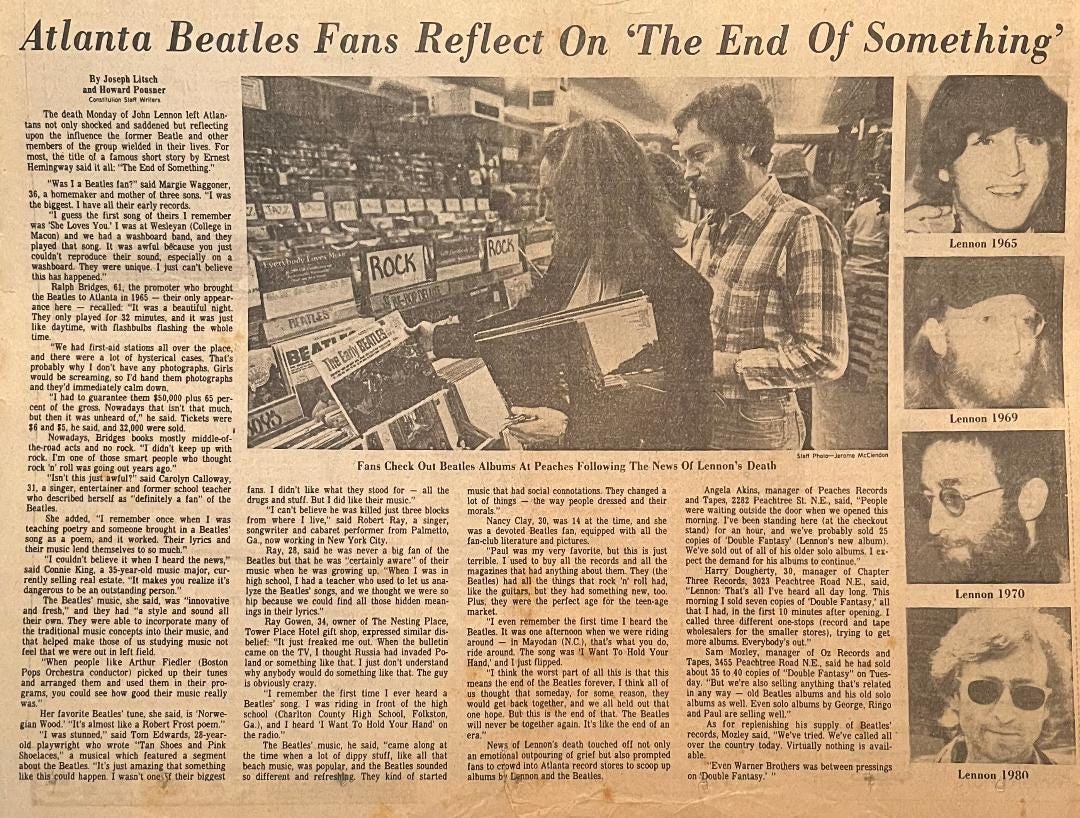The news of John Lennon’s death was thoroughly covered by the U.S. news media. For the most part, the wall-to-wall coverage was respectful. In fact, the coverage indicated a changing of the guard in American journalism. It signaled the rise of baby-boomers in America’s mainstream media. People born after WWII had attained positions with the electronic and print media that gave them authority on what their news organizations should most intensely cover.
The Atlanta Constitution in 1980 was not ready to yield its administrative positions to boomers. It may have seemed a liberal newspaper to most Georgians, but its management was quite conservative. Still the Constitution realized the Lennon story was of great importance to their next (and probably last) group of core readers. Sensitive to the fact, the newspaper issued a 4-page pull-out section, The Lennon Legacy, on December 10, 1980, focusing on the impact John Lennon made, in music and beyond.
The Lennon Legacy featured the reporting and opinions of several Atlanta Constitution writers, most of them boomers. This was a difficult story, personally, for them to cover, but looking at the section 29 years later, the boomers were equal to the task.
Bill King, the newspaper’s popular music critic, wrote the section’s main story on Lennon’s extraordinary life. King reflected on the musical achievements, personal difficulties and the mature summing-up Lennon revealed in recent interviews. Having just turned 40, Lennon spoke as if the best years were just beginning. King referred to a quote from Lennon’s interview in Playboy, which hit newsstands just two days before his death. Lennon was hopeful. “God willing,” he told David Sheff, “there are another 40 years of productivity to go.”
Lennon’s optimism was lifted by the critical and commercial acclaim Double Fantasy, the new album released by him and Yoko Ono. The album’s opening track, “(Just Like) Starting Over” was already a hit single and there were at least two or three other engaging songs that could be hits in the months ahead. The Lennon Legacy included a Bill King review of Double Fantasy. King admitted frustration over not being able to listen to Lennon’s first new recordings in five years straight through because of the inclusion of Ono’s songs, but he still found words of praise for the album. Quite interesting to King was how John Lennon celebrated hearth and home in his new material. After all, King noted, praising the comforts of marital love and fatherhood sounded like Paul McCartney’s musical turf. Yet those were subjects Lennon related to as well. King wrote that “Lennon handles the themes with a minimum of cloying sentiment and a great deal of honest, exhilarating emotion.”
Eleanor Ringel, the Constitution’s film critic, commented on Lennon’s appearances on the silver screen, particularly The Beatles’ A Hard Day’s Night. She wrote that “the high-brow film critics, set to sneer at what they figured would be a Liverpool version of ‘Viva Las Vegas,’ instead sank to their knees and succumbed. Totally.” Ringel, early in her career as one of the nation’s most astute film critics, recalled the praise Bosley Crother of The New York Times had for A Hard Day’s Night, comparing the Beatles to the Marx Brothers.
Perhaps the most sympathetic of the stories written for the section was the one penned by longtime Constitution columnist Celestine Sibley, certainly no baby-boomer. In ‘65, Sibley reported on the concert given by The Beatles in the brand new Atlanta Stadium. While not a student of things Beatlesque, Sibley was a perceptive observer of the human race. She reported on the crowd, mostly young people, in the stadium that night to see and hear the Liverpool mop-tops. In the wake of the Lennon tragedy, she did not write about him or his music but of the people she saw that summer night in ’65. She remembered the little girls being treated for hysterics. She looked back on Beatlemania, Atlanta-style. More than fifteen years after that night, she wondered about those kids, having entered adulthood, with responsibilities and kids of their own. Now they were having to worry about wet diapers and the high cost of gasoline. She thought of how bad they must have felt on the morning of December 9, 1980 to hear that John Lennon had been murdered.
An editor who handled The Lennon Legacy for the newspaper was Jim Auchmutey. He was another boomer taking on more duties in the print media. Auchmutey would remain with Atlanta Newspapers for nearly three decades. His beat was quite often the South; and he would report on its unique character and personalities as well as anyone in the country. Jim was also, like Bill King, a fan and student of The Beatles. Having to work on the Lennon section would be a grind but the Constitution’s readers would be well-served by his labors.
As he started work that gloomy December morning, his mother phoned with a memory from his childhood in nearby Decatur. It was something he had forgotten about long ago. She reminded Jim that he had gone to kindergarten and church with the murderer of John Lennon. It all came back to him. In fact, the two had gotten in a fight on the playground one day. Jim said the guy was “kind of a bully.” Who knew the bully would grow up to be, in the words of a 1981 George Harrison song, “the devil’s best friend”?






If I remember correctly, John Lennon lived it The Dakota which was just next to the apartment building my brother-in-law and wife lived in. So senseless and devastating.